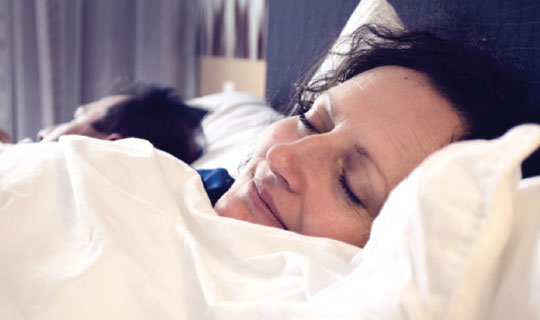“Because I’ve had apnea, I can tell when others have it. Now I send friends to Monmouth Medical Center if they’re having a sleep problem.”

At the Comprehensive Sleep Medicine Center, patients overcome their sleep struggles and improve their quality of life.
Anthony Ceravolo, 65, of Long Branch, had sleep trouble for years. Twenty-five years ago, at age 40, he was diagnosed with obstructive sleep apnea, a condition in which a person temporarily stops breathing while sleeping. The muscles relax, causing soft tissue in the back of the throat to collapse and block the upper airway. This leads to sleep disruption throughout the night and loud snoring. Sleep apnea has been associated with multiple medical conditions, including hypertension, heart disease and stroke.
“Every morning, I’d wake up more tired than I was when I went to bed,” recalls Anthony. “The more I slept, the more tired I got. My wife would find me sleeping in the bathroom, and she wouldn’t let me drive the kids because she was afraid I’d get in an accident. I was barely able to go to work. I thought I was dying.”
Anthony was treated at the Comprehensive Sleep Medicine Center at Monmouth Medical Center (MMC). He was given continuous positive airway pressure (CPAP), which provides pressurized air to patients through a mask they wear while sleeping. This keeps the airways open and prevents the apnea from occurring. “It was life-changing,” recalls Anthony, who is now on his third CPAP machine, which is the size of his hand. “I became a totally different person.”
Uncovering sleep problems
The Center was recently reaccredited by the American Academy of Sleep Medicine (AASM), ensuring that it meets certain high-quality standards. MMC was the first hospital in Monmouth and Ocean counties to earn this prestigious designation. Robert M. Kosinski, MD, a physician who is board certified in both sleep medicine and pulmonology, is the Center’s Medical Director.
The Center’s other staff physicians, board-certified pulmonologist Douglas Livornese, MD, and board-certified neurologist Matthew Davis, MD, are also board-certified in sleep medicine. In addition to obstructive sleep apnea, Center physicians diagnose and treat narcolepsy (periods of extreme daytime sleepiness), insomnia, sleepwalking and sleep talking, and restless leg syndrome, in which patients experience abnormal sensations, such as tingling or cramps in the legs. Sleep problems can also be caused by health conditions, such as chronic heart and lung disease, gastrointestinal disorders and chronic pain disorders, such as fibromyalgia. Both adults and children can be evaluated and treated at the Center.
A multidisciplinary approach
To diagnose a sleep disorder, a variety of tests are available, including overnight sleep studies and daytime testing. During an overnight study, called a polysomnogram, monitors are placed on your body to record brain waves, muscle activity, respiration and heart rhythm while you sleep. People with obstructive sleep apnea, like Anthony, may try the CPAP machine in the Center’s sleep lab. Other evaluations include tests to assess a person’s daytime sleepiness and evaluate him or her for narcolepsy. Home sleep studies for evaluation of sleep apnea are available as well.
“The patient comes in, and we show him or her how to use the monitor that needs to be worn overnight,” says Dr. Kosinski. “It records information, and the patient brings the monitor back to the Center, where we download the information for analysis.”
The Center takes a multidisciplinary approach to sleep disorders. Treatments include weight loss, behavioral modification, medication, surgery and devices, such as the CPAP machine. “By treating sleep disorders, we can change a person’s life,” says Dr. Kosinski. “The person goes from being sleepy and not functioning well to getting his or her life back.”
Recently, Anthony had a knee replacement, and he wasn’t sleeping well afterward. He underwent reevaluation and an overnight sleep study at MMC’s Sleep Medicine Center and discovered he doesn’t need as much air pressure from the CPAP machine. (He recently lost about 20 pounds.)“Because I’ve had apnea, I can tell when others have it,” he says. “Now I send friends to Monmouth Medical Center if they’re having a sleep problem.”
Get more shut-eye
Robert M. Kosinski, MD, Medical Director of the Comprehensive Sleep Medicine Center at Monmouth Medical Center (MMC), recommends the following strategies for falling— and staying—asleep:
- Keep a regular sleep schedule.
- Avoid daytime naps.
- Don’t watch TV or work on your computer in bed. The bedroom should only be used for sleep.
- If you’re having trouble going to sleep, don’t spend too much time in bed. Get up and do something relaxing (like reading in another room) for 20 minutes, then head back to bed.
To learn more about the comprehensive Sleep Medicine Center click here or call: 732.923.7660.